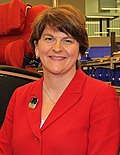Executive of the 5th Northern Ireland Assembly | |
|---|---|
| 4th Executive of Northern Ireland | |
| May 2016 – January 2017 | |
  | |
| Date formed | 26 May 2016 |
| Date dissolved | 16 January 2017 |
| People and organisations | |
| Head of state | Elizabeth II |
| Co-heads of government | Arlene Foster (First Minister) Martin McGuinness (deputy First Minister) |
| No. of ministers | 10 (+ 2 junior ministers) |
| Member party | DUP Sinn Féin |
| Status in legislature | Power–sharing coalition |
| History | |
| Election | 2016 assembly election |
| Legislature term | 5th Assembly |
| Predecessor | Executive of the 4th Assembly |
| Successor | Executive of the 6th Assembly |
| This article is part of a series within the Politics of the United Kingdom on the |
 |
|---|
The Fourth Executive was, under the terms of the Northern Ireland Act 1998, a power-sharing coalition.
Contents
Following the 6 May 2016 elections to the fifth Northern Ireland Assembly, the Democratic Unionist Party and Sinn Féin remained the two largest parties in the Assembly.
Notably for the first time in the assembly's history, parties entitled to seats on the executive could instead opt to go into formal opposition. The UUP, SDLP and Alliance all took up this option, leaving the DUP and Sinn Féin to form a government.
The 4th Northern Ireland Executive was formed on 25 May 2016. It lasted less than a year, and collapsed on 16 January 2017 following the resignation of deputy First Minister McGuinness in protest at the Renewable Heat Incentive scandal. [1]